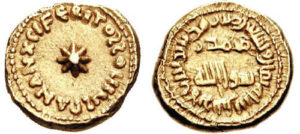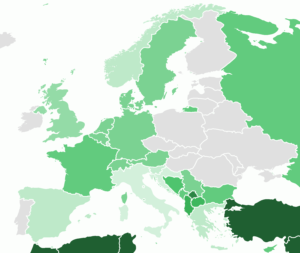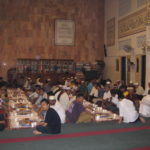Islam is the world’s second-largest religion. This means more than one out of every six people in the world is Muslim. One would wonder how religion spreads to such a large sum of people. Islam spread through military conquest and trade. The impact of Islam was great; the religion had such a large influence on the people around them. For example, Islam affected Europe in areas of science, mathematics, and geography, some ideas that western civilization uses today.
The military aided Islamic expansion tremendously. For a military to be beneficial at all it is imperative to have enough dedicated and trustworthy soldiers. To have a devoted soldier, they need some kind of drive or motivation. To build the military strength of the state, Umar established a kind of national registry. People in the registry were capable to receive a share in the wealth of the community when they or members of their families enlisted in the armies. As a reaction to this, many Arabs joined the armies to qualify for these new allowances. Umar’s policies led to the rapid expansion of the Muslim empire. As for the people they conquered, they did not force them to convert but they did tax non-Muslims heavier than Muslims.
Trade was an important role in the expansion of Islam
While the Umayyads had expanded the Islamic empire by conquest, during the Abbasid period expansion by trade and exchange became more common. To a large degree, this expansion was the result of geography.
 Baghdad was the center of all Islamic trade. It was located at the center of both overland and water routes, it became a big meeting place for trade from China, India, Africa, and Europe. While the Muslims were trading, and bringing wealth to the empire, they were also spreading their religion. In fact, in India, Muslim traders’ goal was to spread the Islamic religion and culture. Trading centers in India soon had large Muslim communities.
Baghdad was the center of all Islamic trade. It was located at the center of both overland and water routes, it became a big meeting place for trade from China, India, Africa, and Europe. While the Muslims were trading, and bringing wealth to the empire, they were also spreading their religion. In fact, in India, Muslim traders’ goal was to spread the Islamic religion and culture. Trading centers in India soon had large Muslim communities.
The spread of Islam in Europe
The impact of the spread of Islam had a great effect on Europe in the areas of science mathematics and geography. Muslims scholars introduced the Indian number system, including zero, and later the decimal system into the Greek math. Al-Khwarizmi, a Muslim mathematician used these tools to write a textbook called al-jabr, or algebra.
 The book circulated throughout Europe and it was very influential to them. They named the new numbers introduced in the book “Arabic” numerals. Great advances were also made in astronomy. They revived the astrolabe, an instrument invented by the Greeks that allowed observers to chart the positions of the starts and calculating their own position on earth. As they learned to navigate by the stars, Muslim merchants and explorers traveled more widely than ever. To help them, Muslim geographers developed new maps and more accurate ways of calculating distances. This probably befitted European merchants and explorers. Ibn-Sina, a Muslim doctor, wrote a medical encyclopedia that became the standards reference through Europe.
The book circulated throughout Europe and it was very influential to them. They named the new numbers introduced in the book “Arabic” numerals. Great advances were also made in astronomy. They revived the astrolabe, an instrument invented by the Greeks that allowed observers to chart the positions of the starts and calculating their own position on earth. As they learned to navigate by the stars, Muslim merchants and explorers traveled more widely than ever. To help them, Muslim geographers developed new maps and more accurate ways of calculating distances. This probably befitted European merchants and explorers. Ibn-Sina, a Muslim doctor, wrote a medical encyclopedia that became the standards reference through Europe.
The expansion of Islam consisted of military conquest and trade. Islam expanded to such a large amount of people that it influenced Europe in areas of science, mathematics, and geography. Islam is and was a very influential religion






